Kurdish PKK burns guns in big step towards ending Turkey conflict
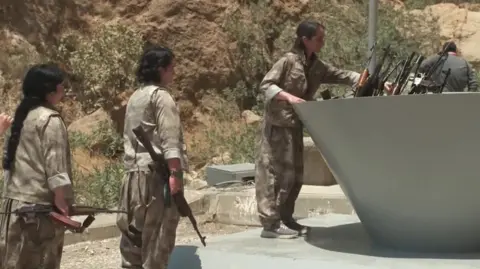 Reuters
ReutersAfter four decades of armed struggle against the Turkish state, the outlawed Kurdish PKK has held a ceremony to mark a symbolic first step in laying down its arms.
About 30 fighters, men and women, placed their weapons in a cauldron, starting a disarmament process expected to last all summer.
The Turkish government has hailed the ceremony as crossing a "critical threshold" towards achieving a "terror-free Turkey".
Some 40,000 people have been killed since the conflict began, and the PKK is listed as a terror group in Turkey, the US, EU and UK. Its disarmament will be felt not just in Turkey but in Iraq, Syria and Iran.
How did the disarmament begin?
A convoy of reporters and politicians, including members of Turkey's pro-Kurdish opposition Dem party, were taken to a well known tourist spot to witness the ceremony - at Jasana cave 50km (30 miles) north-west of the city of Suleymaniyah in Iraqi Kurdistan.
The PKK fighters, including four high-ranking officials, lined up to put their weapons in the cauldron, where they were set alight.
"We voluntarily destroy our weapons, before your presence, as a step of goodwill and determination," the group said in a statement, describing it as a historic, democratic step.
Earlier this week, the PKK's long-imprisoned leader, Abdullah Ocalan, said it was "a voluntary transition from the phase of armed conflict to the phase of democratic politics and law".
Ocalan has been in solitary confinement on the small prison island of Imrali, south-west of Istanbul, since he was captured in 1999.
The process will continue over the coming months at points set up with the involvement of the Turkish, Iraqi and Kurdistan regional governments, BBC Turkish has been told.
Who are the PKK and why has the conflict lasted so long?
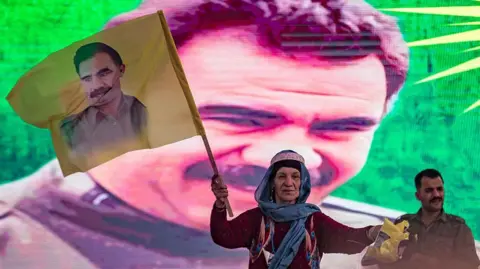 DELIL SOULEIMAN/AFP
DELIL SOULEIMAN/AFPThis is not the first attempt at peace involving Turkey and the PKK, but this is the best hope so far that the armed struggle that began in 1984 will come to an end.
Originally a Marxist group, the Kurdistan Workers' Party took up arms calling for an independent state inside Turkey.
In the 1990s, they called instead for greater autonomy for Kurds, who make up about 20% of the population.
Ocalan announced a ceasefire in 2013, and urged PKK forces to withdraw from Turkey. The 2015 Dolmabahce Agreement was supposed to bring democratic and language rights for Kurds, but the fragile truce collapsed amid devastating violence, especially in the Kurdish-dominated cities of the south-east, including Diyarbakir.
Turkey's air force targeted PKK bases in the mountains of northern Iraq. Several military campaigns have also targeted Kurdish-led forces in Syria.
The government in Ankara ruled out further talks until the PKK laid down its arms. That has now begun to take place.
Why has the PKK decided to disband?
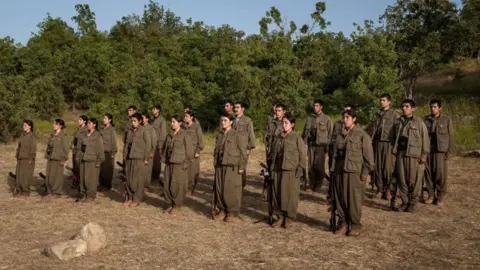 Getty Images
Getty ImagesIn October 2024, a prominent nationalist leader and key Erdogan ally called Devlet Bahceli began a process described by the government as "terror-free Turkey". He urged the PKK's imprisoned leader to call for the dissolution of the outlawed group. It could pave the way for his possible release from Imrali island, he suggested.
The Turkish government launched talks with Ocalan via the pro-Kurdish Dem party, and then in February came his historic appeal for the PKK to disband, read out by two Dem MPs who had just returned from a visit to the prison island.
"All groups must lay their arms and the PKK must dissolve itself," read Ocalan's letter.
The PKK had been formed primarily because "the channels of democratic politics were closed", he said, but Devlet Bahceli and Erdogan's own positive signals had created the right environment.
The PKK followed Ocalan's lead and declared a ceasefire and later declared that it had "completed its historical mission": the Kurdish issue could now "be resolved through democratic politics".
President Erdogan said it was an "opportunity to take a historic step toward tearing down the wall of terror" and met pro-Kurdish politicians in April.
Why is Ocalan so important?
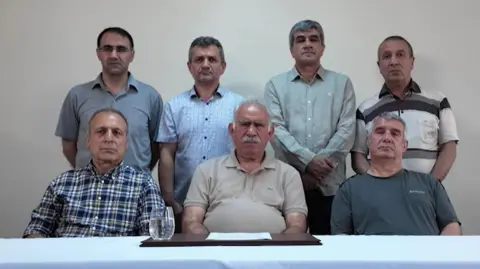 ANF
ANFAs founder of the PKK, Ocalan continues to be reviled by many Turks, even after 26 years in solitary confinement.
And yet he still plays an important role in the eyes of Kurds.
"I think he really has this authority; he is a main symbol for many Kurds, not all," says Joost Jongerden, a specialist on the 41-year conflict at Wageningen University in the Netherlands.
Two days before the PKK were due to begin disarmament, Ocalan appeared on video for the first time since he was put on trial more than 20 years ago.
Speaking for seven minutes, he addressed the outlawed group: "I believe in the power of politics and social peace, not weapons. And I call on you to put this principle into practice."
Ocalan was wearing a beige Lacoste polo shirt, and in an indication of his enduring relevance, the shirt quickly went viral and websites selling it ran out of stock.
What happens next?
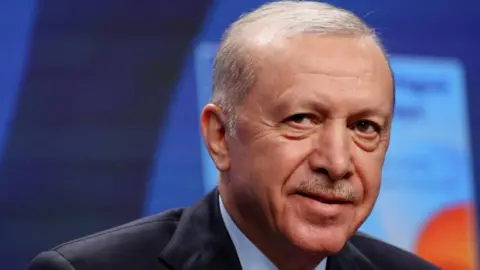 Reuters
ReutersThe scene will now switch to Turkey's parliament in Ankara where a commission will be set up to make decisions on the next steps for the government.
As the summer recess is around the corner, no concrete decisions are expected for several months, when MPs vote on the commission's recommendations and President Erdogan has the final say.
What happens to Abdullah Ocalan is not yet clear. The government says his conditions in jail could be reviewed as the process unfolds, but any chance of release will be left to the latter stages.
What's in this process for Erdogan?
Erdogan's AK Party has begun work on changing the constitution, and there has been speculation that this would mean Erdogan would be able to run for the presidency again when his final term runs out in 2028.
The AKP and pro-Kurdish Dem party deny there is any link between the peace process and reshaping the constitution, but if Erdogan secures Dem support he would have a far greater chance of pushing through changes.
Erdogan is behind in the polls, but his main opposition rival, Istanbul Mayor Ekrem Imamoglu, is in jail accused of corruption, which he denies, and more opposition mayors have been arrested as part of a crackdown in the past week.
